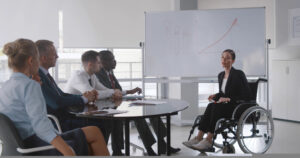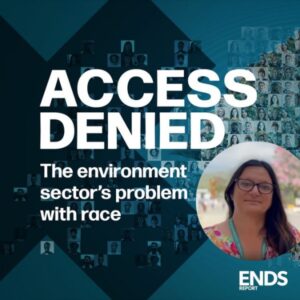

On 3 July 2025, I attended the second-ever RACE Summit, hosted by The RACE Report and the DSI. Sustainability is about more than just achieving net zero, it’s also about ensuring that everyone has a seat at the table. This event offered action-oriented workshops, progressive conversations, practical takeaways and in-person networking, designed to create a more inclusive environmental sector and accelerate our journey towards a sustainable future.
The diversity gap in sustainability
It may surprise you that the sustainability and environment sector is one of the least diverse in the UK. According to the 2024 RACE Report, only 4.5% of sustainability professionals identified as people of colour or from racially marginalised groups, compared with 12.64% across all UK professions.
The climate and ecological crises we face are rooted in colonial legacy – extraction in resource-rich regions displaced disadvantaged communities across the global south, and systemic racism still persists today. This means that individuals from minority backgrounds often face more barriers when trying to enter the profession, including a lack of representation and accessibility to volunteering opportunities and “required” experience for sustainability and environment-related roles.
Sustainability is about creating a just, liveable future for all. Excluding diverse voices from decision making processes and action means that our future can’t be considered truly sustainable, so everyone needs to be represented and have their voice heard.
My experience at the RACE Summit
As a young woman of colour, I’ve encountered discrimination in the countries I’ve lived in and throughout my career, and I know I’m not the only one. The RACE Summit was a breath of fresh air — a place where marginalisation is understood without lengthy explanations and challenging conversations are encouraged.
The Summit embraced intersectionality and not only race, covering gender, class and age, among other aspects. It was amazing to meet peers with shared lived experiences, as I am often one of the only young people of colour at the sustainability-related events that I attend.
I participated in workshops focusing on intergenerational allyship and youth leadership, values-driven purpose in sustainability careers, and reimagining climate action through environmental justice and anti-racism. These are my key takeaways from those sessions:
- We each hold the power to make a difference; our backgrounds and challenges shouldn’t prevent us from trying to build a fairer world
- Inclusive sustainability needs representation at every level
- Youth and intergenerational alliances are crucial for multiplying impact
- Community bonds overcome isolation and fuel collective progress
How we can be truly inclusive
We all share a responsibility towards fostering diversity in our workplaces and networks, not just individuals from minority backgrounds themselves. Here’s how you can get started:
- Encourage open dialogue – invite challenging questions and don’t be afraid to admit when you don’t know something. As a person of colour, I appreciate when someone takes a genuine interest in my background and experiences, even though it may be an uncomfortable question to ask initially
- Embrace imperfection – it’s better to speak up and learn from mistakes than to remain silent (otherwise, how can we expect positive change to happen?!)
- Champion underrepresented voices – create platforms where everyone is able to share their ideas and help build meaningful communities. MS Teams groups with clear guidelines to help facilitate safe spaces within organisations tend to work well for this
- Commit to continual learning – e.g. through workshops, reading groups and allyship trainings, and encouraging employees from all areas and levels to participate
As a society, our sustainability goals will fall short if we don’t confront the racial and social inequities at their core. By taking steps to address these, we can ensure that the fight for a more a sustainable future succeeds when it includes every voice.



